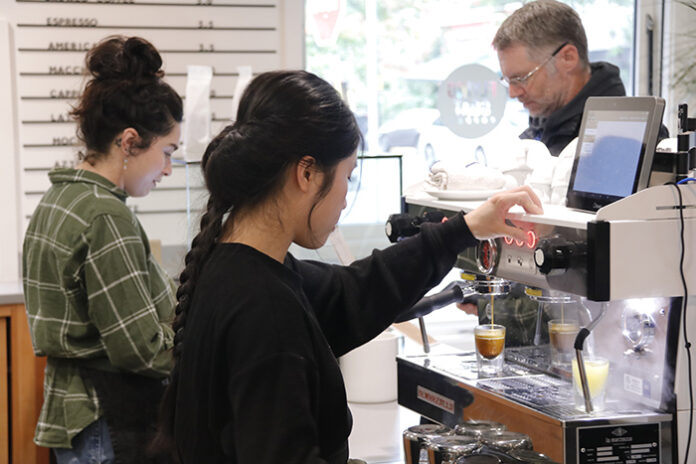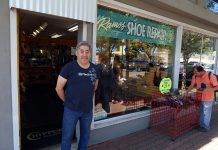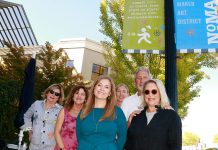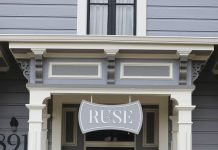
One quiet morning last week, the long-closed corner store at Matheson and Center took down their plywood walls and threw open the doors of 300 Center St.—the newest incarnation of Healdsburg’s longtime favorite coffee bar, the Flying Goat.
First in, tentative singles, then couples, then groups, the customers came in all week—perhaps drawn by the hiss of the espresso machine, or the aroma of a fresh-brewed cup, but most likely the reputation of the Goat, which has been pretty much off the downtown scene since COVID hit.
“They did gangbusters over the weekend,” said Flying Goat owner and founder Phil Anaker of the new shop’s first week. “A lot of people have been waiting a long time… We’ve been fielding daily questions (about reopening) over the past two years at 419.”
That’s the address of the small second Healdsburg coffee shop the Goat kept open during the pandemic, 419 Center St. It’s a tidy storefront next to the former Raven Film Center, where they continued to roast their beans and offer a small selection to walk-in customers throughout the past two years.
But paralyzed retail sales during the early months of the pandemic forced the Flying Goat to give up their longtime lease at 324 Center, and a Santa Rosa shop at Railroad Square, opened in 1996, had to close its doors as well. And for some it seemed that, well, the Goat had flown.
Roots of the Fruit
Some say it was Alfred Peet who brought the culture of fine coffee to California, when he opened Peet’s Coffee, Tea & Spices in Berkeley in 1966. And some say it was Jerry Butler who set the stage for global coffee domination when his marketing manager, Howard Schultz, expanded the then-Seattle only Starbuck’s across the country in the late 1980s.
But it was Phil Anaker and Maura Harrington who brought coffee culture to wine country. They met as students at UC Berkeley, becoming, as Anaker said, “long-time friends and business partners,” opening the combined café, bakery and roastery at 324 Center St. in 1994.
Harrington, an artist whose unerring eye and good taste set the stage for the Flying Goat’s success, managed the retail operations and the overall branding of the Flying Goat. But she died of cancer in 2019, and a few months later a new rental manager at the Masonic Temple location they had for almost 25 years took over.
“While we had had a really positive relationship with the previous president of that association, the new people who came in decided that it was more of a business relationship,” said Anaker tactfully. “They decided to double our rent.”
The onslaught of COVID just two months later was another blow, which cut their staff by over half and their business even more so. They continued to sell coffee beans to area restaurants (Healdsburg Bar & Grill, Valette, Barndiva, the Matheson and the new Cyrus, among others), even though the retail side collapsed, but times were tight all around.
It’s All About the Bean
Meanwhile, Anaker continued to source prime beans from the coffee countries surrounding the equator, where he had been going for years.
“About 90% of the coffee that we buy comes from producers that we have been working with directly for a really long time,” said Anaker. “These are relationships we’ve had for 15-plus years in some cases. I was the green coffee buyer, focused on the wholesale and the quality control.”
Green coffee is a bit of a misnomer; it’s what they call unroasted coffee—it’s usually roasted after delivery—but a truly ripe coffee cherry is “blood of the bull” color, the red of the fruit surrounding the seed that becomes the bean.
In fact, “Coffee is a Fruit” is Anaker’s current business name, emphasizing that coffee is a tree fruit, has health benefits and is “an agricultural product that is grown by people who are really talented at what they do,” he said. And he’s quick to compare a fine coffee to a quality pinot, with its own characteristics, color, aromas and flavor profile.
Always, Anaker’s emphasis is on quality. “There are a lot of places in the supply chain where things can go wrong, so it’s important to work with people who really know what they’re doing, and pay them for the work they do, to get the quality we want.”
While restaurants emphasize farm-to-table, the Flying Goat’s emphasis is farm-to-cup, said Anaker, following a model known as direct trade—working with farmers in their fields, negotiating contracts and pricing, and paying “two or three times, four times as much as what the commodity price is. And in exchange, what we get is exceptional quality.”
The new shop at 300 Center is smaller and more focused than the former flagship, without a lot of room to sit down (or flip open a laptop to catch up on social media) because the emphasis is on the brew, whether a pour-over cup (from a pair of twin Marco SP9s) of a single origin bean or a blend, or a hand-drawn espresso from the single machine (a custom-painted La Marzocco Linea PB) in the 800-square-foot shop.
A few high seats may soon arrive to linger over the latte, and benches are contemplated to wrap around the exterior of the corner shop. But a side window on the Matheson side is being readied for quick pickup of phoned-in or app-ordered coffees, following a model closer to a coffee kiosk than a coffee shop and opening up the business to the busy life of the Healdsburg Plaza more than ever.
“I really have to give a shout out to my staff who stuck with us,” Anaker said, “and who have worked so hard to get us back to this point. Like I said, I kind of designed this bar for them—and they do all the magic.”
Now of course their former flagship café has been taken over by Ukiah’s Black Oak Coffee; Cloverdale’s Planck has come to town at Dry Creek Road and Grove Street; and even downtown the pizzeria Pizando has upped their espresso game. But Anaker exudes the confidence in his product, and his staff, that suggests he’s ready for Flying Goat 2.0.
Full disclosure: The reporter’s son worked as a barista at Flying Goat in the early 2000s, and his wife is HR director.







